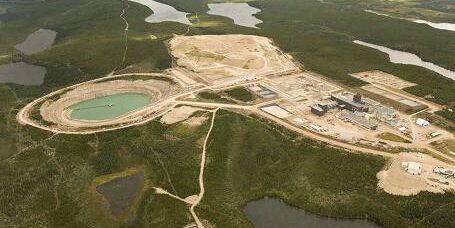A just-released report, Building Canada’s Clean Future, contains a plan “to modernize federal assessment and permitting processes to get clean growth projects built faster.” Cabinet and Privy Council Office (PCO) appear to have fallen under the spell of corporations who claim that the federal government is slowing down their oil, gas, nuclear, and mining projects through excessive regulation.
Members of a Cabinet Ministerial Working Group on Regulatory Efficiency for Clean Growth Projects, and its PCO supporters, appear to lack scientific and technical knowledge to critically evaluate nuclear power and other technologies from a sustainable development perspective.
Natural Resources Canada (NRCan) minister Jonathan Wilkinson and environment minister Steven Guilbeault are Working Group members. The group is chaired by former NRCan minister Seamus O’Regan, who launched a Small Modular [nuclear] Reactors (SMR) Action Plan in December 2020.
They might consider studying the New Brunswick government’s losing bet on SMRs.
The Clean Future report ignores concern about costs and impacts on local communities of resource extraction. Combating climate change is perverted to promoting unlimited growth of all resource industries, apart from oil drilling. The report is silent on conserving resources or limiting waste.
Aided and abetted by an apparent inability of federal civil servants to “speak truth to power,” Cabinet has become divorced from the realities of life for average Canadians, who are looking for help in reducing the costs of feeding their families, heating their homes, and traveling to work – help that could involve ways to reduce, rather than expand, their consumption of resources.
Clean growth promoters in PCO cut their teeth in the natural resources and environment sectors. Wilkinson’s deputy minister at NRCan, John Hannaford, became Canada’s top civil servant in June 2023 — Clerk of the Privy Council Office. The following month, Mollie Johnson, then Assistant Deputy Minister, Low Carbon Energy Sector at NRCan, became Deputy Secretary to the Cabinet, Plans and Consultations. In August 2023, Paul Halucha, then Associate Deputy Minister of Environment and Climate Change, became Deputy Secretary to the Cabinet (Clean Growth).
In September 2023, the Ministerial Working Group was established.
After the release of the 2023 federal budget, Canadian Nuclear Association CEO John Gorman offered this glowing tribute on LinkedIn:
I am personally grateful to Minister Wilkinson in particular, and his team of dedicated staff at NRCan (including but not limited to Mollie Johnson, Claire Seaborn, John Hannaford, and Debbie Scharf), who have championed the role of nuclear in Canada… It’s testament to his dedication to his country and commitment to delivering on his promise to secure a clean energy pathway for Canada.
Wilkinson, O’Regan, Guilbeault, Hannaford, Johnson, and Halucha all have degrees in political science and/or international relations. Does this qualify them to plan Canada’s future – including the future of Indigenous and rural Canadians who are impacted by energy and resource extraction projects? Can they critically assess nuclear technologies?
Adding the adjective “clean” does not make extractive technologies sustainable and beneficial for Indigenous and rural communities. To paraphrase David Suzuki, when terms like “clean energy”, “clean economy”, “clean growth”, and “clean future” are applied to mining uranium, clear-cutting forests, and fracking natural gas, “I want to puke”.
The Clean Future report says, “expanded use of low-emitting nuclear energy is key to achieving our climate ambitions and reaching net-zero emissions by 2050.” It says this “includes proven Canadian technology like the CANDU, as well as small modular reactors (SMRs).”
Calling nuclear power “clean” is absurd when it produces vast amounts of pollutants and waste, ranging from toxic mine tailings to irradiated fuel rods.
The report aims to enable nuclear projects when the Impact Assessment Agency of Canada reviews the Physical Activities Regulations later this year. But SMRs are already exempt from assessment. All but the very largest uranium mining projects are exempt.
The Harper government gutted Canada’s environmental assessment regime in 2012. The Trudeau government further weakened it in 2019 and relabeled it “impact assessment”. How could more deregulation spark “clean growth”?
Cabinet and the PCO bureaucrats also want to speed up projects for critical minerals, biomass/biofuel, carbon capture and storage, hydrogen, EV battery manufacturing, and liquid natural gas — all in the name of “advancing reconciliation with Indigenous Peoples.”
The report fairly gushes about the Cedar LNG project in BC:
Cedar LNG is a proposed floating liquid natural gas (LNG) facility in Kitimat, British Columbia, within the traditional territory of the Haisla Nation. The project leverages Canada’s abundant natural gas supply and the province’s growing LNG infrastructure to produce industry-leading, low-carbon, cost-competitive Canadian LNG for overseas markets. Cedar LNG is the world’s first Indigenous majority-owned LNG project and expects to have one of the cleanest environmental profiles in the world and providing unprecedented opportunities for the Haisla Nation and the region.
There is no reason to have duplicative review processes if one is sufficient. Recognizing this, the federal Minister of Environment and Climate Change and British Columbia agreed to one assessment – the provincial process – to get the project moving forward. Because of this, the project was assessed and approved in just 3.5 years.
Did the report’s authors forget that LNG is a fossil fuel?
Deregulation is a familiar nostrum. If the federal government would just get out of the way of large corporations, while still providing them with ample subsidies, all will be well — especially if enough First Nations buy into this neocolonial version of “reconciliation”.
If Canada’s Clean Future plan is unregulated and unlimited resource extraction, ecosystems will be destroyed, traditional practices of Indigenous communities will be disrupted, boom-and-bust cycles will be accelerated, and false “solutions” like SMRs and LNG will delay genuine climate action.
Our collective future as a human species will be nasty, brutish, and short.



